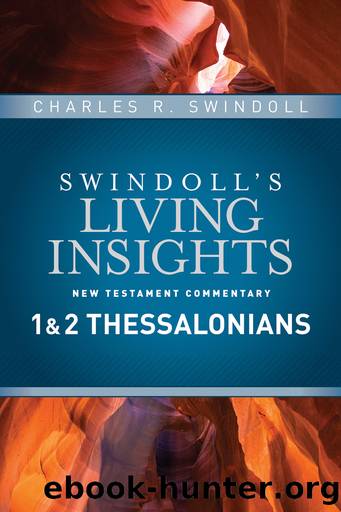Insights on 1 & 2 Thessalonians by Charles R. Swindoll

Author:Charles R. Swindoll
Language: eng
Format: epub
Tags: RELIGION / Biblical Commentary / New Testament
ISBN: 9781496409690
Publisher: Tyndale House Publishers, Inc.
Published: 2016-09-01T00:00:00+00:00
â 5:1-2 â
Though Paul continues to discuss future things in 5:1-11, he makes a gentle transition within that subject. He uses two small Greek words, peri de [4012, 1161], to indicate this transition.[31] We might translate this phrase, ânow concerning.â Paul often uses this same phrase to indicate a change of subject (1 Cor. 7:1, 25; 8:1; 12:1; 16:1, 12; 1 Thes. 4:9). It doesnât necessarily mean a completely unrelated topic, as indicated by the use in 1 Corinthians 7:25, where Paul transitions to a different issue under the larger subject of the end times. However, it does indicate that Paul is âshifting gears,â so to speakâturning his focus from one aspect of a topic to a different aspect.
This fact is important when we realize that Paul has just comforted believers who feared that their loved ones who had fallen asleep in the Lord would somehow miss out on the blessings of the coming kingdom at Christâs return. Paul assured them, however, that there would be a glorious reunion prior to the establishment of the kingdom. The dead in Christ would rise first, then those who were alive would be transformed; both groups would be âcaught upâ together to meet the Lord in the air (1 Thes. 4:16-17). This doctrine of the Rapture of the church was meant to give encouragement to those who were grieving the loss of their brothers and sisters in Christ.
In 5:1, Paul takes a turnânot a 180-degree shift to an unrelated topic, but a 90-degree turn to a different side of the same issue related to the end times. Paul was no longer discussing the details of the Rapture and the order of end-times events as revealed by Jesus through Paul. Now heâs moving to the same question Jesus had explicitly and repeatedly addressed in His own teaching on the end times: the unexpected nature of the end times and how we ought to live now in light of them. (See âNobody Knows the Day or the Hourâ on page 78 for more information.)
So, in 5:1, Paul begins by noting that the Thessalonians have no need for anything else to be written to them because nobody knows the âtimes and the epochs.â Why not? Because from the time of Christâs earthly ministry, the disciples had been informed that the earthly judgments associated with the day of the Lord would come like a thief in the night (Matt. 24:43; Luke 12:39; 2 Pet. 3:10). Paulâs readers were already aware of this part of the end-times teaching. He had likely taught it to them personally when he was with them.
Over the years, Iâve heard frightening and heartbreaking stories of people who have experienced break-ins by thieves in the night. Not one of them involves the perpetrator announcing his forced entry with a blaring alarm and a loud shout. But when Paul discusses the Resurrection and the Rapture of the church (1 Thes. 4:13-18), he implies that this special coming of Christ to rescue His church âfrom the wrath to comeâ (1:10) will be distinct from the coming day of the Lord (5:1-2).
Download
This site does not store any files on its server. We only index and link to content provided by other sites. Please contact the content providers to delete copyright contents if any and email us, we'll remove relevant links or contents immediately.
It's Never Too Late by Kathie Lee Gifford(628)
The 9.9 Percent by Matthew Stewart(601)
Hebrews, James by George H. Guthrie & George H. Guthrie(585)
Take Back Your Time by Christy Wright(584)
Israel: Ancient Kingdom or Late Invention? by Daniel I. Block(557)
The New Oxford Annotated Bible with Apocrypha by unknow(556)
The Book Every Leader Needs to Read by 48 Authors(553)
Eating the Bible by Rena Rossner(544)
Insights on Hebrews by Charles R. Swindoll(539)
Psalms, Proverbs, Ecclesiastes, and Song of Songs by John W. Hilber & Tremper Longman III & Duane Garrett(524)
The Jew in the Lotus by Rodger Kamenetz(483)
Commentary on the Torah by Richard Elliott Friedman(473)
Judges: Volume Two by unknow(471)
Who Wrote the Bible? by Richard Elliott Friedman(461)
NKJV, Ignite, eBook by Thomas Nelson(440)
Job, Ecclesiastes, Song of Songs by August H. Konkel & Tremper Longman III(436)
Proverbs, Ecclesiastes, Song of Solomon (Ancient Christian Commentary on Scripture) by J. Robert Wright(435)
Commentary on James (Commentary on the New Testament Book #16) by Robert H. Gundry(435)
Reading the Bible with Rabbi Jesus by Tverberg Lois(411)
